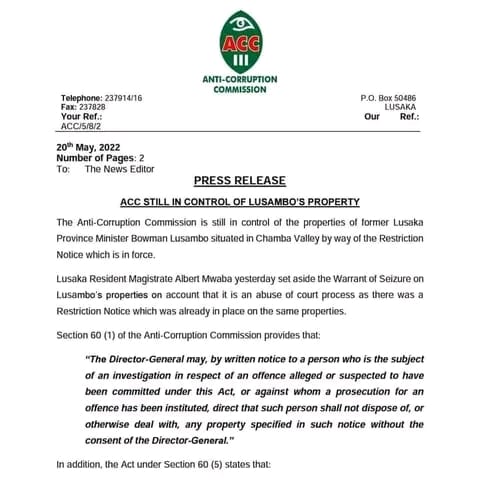WE ARE STILL INCHARGE OF LUSAMBO’S PROPERTY – ACC
The Anti-Corruption Commission is still in control of the properties of former Lusaka Province Minister Bowman Lusambo situated in Chamba Valley by way of the Restriction Notice which is in force.
Lusaka Resident Magistrate Albert Mwaba yesterday set aside the Warrant of Seizure on Lusambo’s properties on account that it is an abuse of court process as there was a Restriction Notice which was already in place on the same properties.
Section 60 (1) of the Anti-Corruption Commission provides that:
“The Director-General may, by written notice to a person who is the subject of an investigation in respect of an offence alleged or suspected to have been committed under this Act, or against whom a prosecution for an offence has been instituted, direct that such person shall not dispose of, or otherwise deal with, any property specified in such notice without the consent of the Director-General.”
In addition, the Act under Section 60 (5) states that:
“A person aggrieved with the directive of the Director-General issued under subsection (1) may apply to the High Court for an order to reverse or vary the directive.”
The Restriction Notice is therefore still in force as there has been no decision of any competent court to reverse or vary it.
Further, the Commission is dissatisfied with the ruling of the Court to set aside the Warrant of Seizure as provided under the Anti-Corruption Act no. 3 of 2012 subsection 58(1) which provides for the seizure of properties under investigation.
The Commission is currently studying the decision of the Court and is contemplating on exercising its right of appeal to challenge the setting aside of the Warrant of Seizure.
The Commission notes that, while it respects the decision of the Court, there is no legal requirement for the Commission to cancel a Restriction Notice before a Warrant of Seizure can be obtained. The two actions can be enforced without any repercussions to the other as they each serve different purposes. The provisions under Section 58(1) of the Anti-Corruption Act states:
“Where in the course of an investigation into an offence under this Act, an officer has reasonable grounds to suspect that any movable or immovable property is derived or acquired from corrupt practices, is the subject matter of an offence or is evidence relating to an offence, the officer shall, with a warrant, seize the property.“
The Commission believes that it is on firm ground on the actions it is taking in its quest to investigate and prosecute matters relating to the corrupt acquisition of property.
QUEEN K. CHIBWE (Mrs.)
COMMISSION SPOKESPERSON

